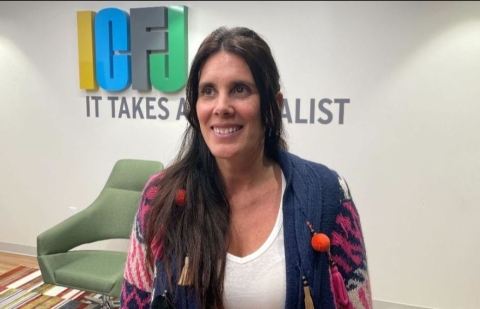At ICFJ, we have long worked to help journalists fight the scourge of rampant disinformation in countries from Brazil to India to Nigeria. The prevalence of falsehoods during the recent U.S. midterm elections is the latest reminder why that work is just as vital in our own backyard.
We have responded to the need with programs to fight the tide of disinformation in U.S. Spanish-speaking audiences and to amplify trustworthy sources in coverage of everything from the New Mexico governor’s race to Tuesday’s Georgia Senate runoff.
We can’t do this important work without your support, and we invite you to consider making a contribution to ICFJ as we approach the end of the year.
ICFJ Knight Innovation Fellows are bringing cutting-edge tools and strategies across borders to address the U.S. disinformation crisis head-on.

ICFJ Fellow Laura Zommer – a fact-checking pioneer from Argentina – created Factchequeado in response to election misinformation spreading through Spanish-speaking communities in the U.S. More than two dozen news outlets and fact-checking organizations in 15 U.S. states, including all swing states, are sharing verified information from Laura’s group – on everything from inflation to early voting. Factchequeado has been featured in The New York Times and on CNN’s Anderson Cooper 360.

ICFJ Fellow Sérgio Spagnuolo of Brazil adapted his social media analytics tool to create "Election SOS" Pulse. It highlights posts by 300 nonpartisan experts to help journalists identify trending questions and authoritative sources. Pulse was adopted by New Mexico In Depth, an investigative reporting news outlet in a state where disinformation was rampant during close governor’s and House races. Most recently, Pulse helped amplify reliable information about efforts to expand voting days during Georgia's runoff election.
ICFJ is here to ensure that journalists like Sérgio, Laura and their teams can do their important work. If you haven’t yet, please help support our vast global network of journalists – 132,000 strong, in 180 countries – who are doing the jobs our democracies demand.
On behalf of all the journalists we work with, here at home and abroad, thank you for your support. All of us at ICFJ wish you a happy and healthy holiday season.